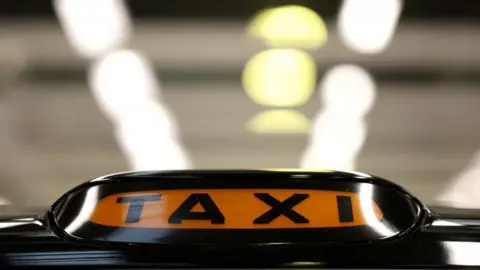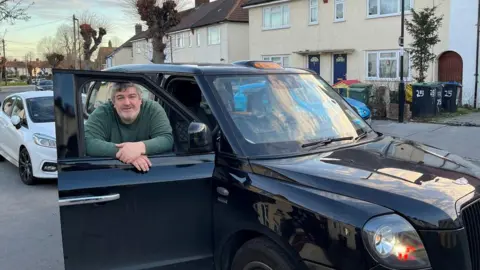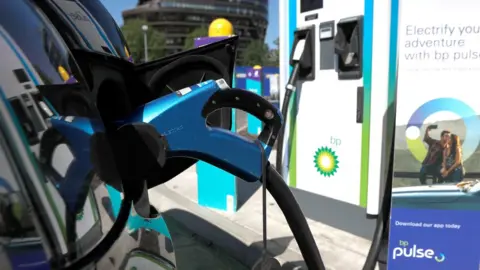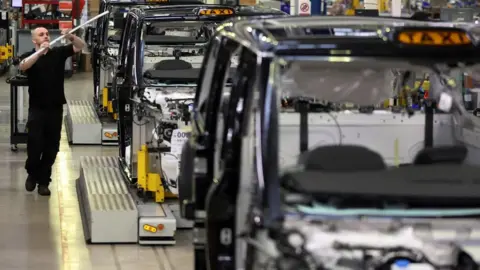London Taxis: 'It's cheaper to use petrol than electricity'
 Reuters
ReutersBlack-cab drivers are finding it cheaper to run their hybrid taxis on petrol rather than electricity because of rising prices, the BBC has learned.
Drivers relying on rapid and ultra rapid public charging points have seen a 50% price increase in the last year, according to the RAC's Charge Watch.
Taxi drivers' unions are calling for lower prices for on-street charging with a reduction in VAT.
The government said it had generous tax measures for zero-emissions vehicles.
 Kevin Paul
Kevin PaulKevin Paul has been a black cab driver in London for six and a half years, driving his LEVC hybrid cab for three.
He has to charge it on the street as there are no facilities at his home in Croydon, south London, and said his costs have risen so much, he has been forced to use petrol.
'I don't have a problem with green infrastructure but it needs to be affordable', Mr Paul said.
"The street charger when I first started cost in the region of £7-£8. The same charge today, is well over £16, and has nearly doubled in the last year."
"The lack of charging points in the city also means that taxi drivers are losing two hours of work a day, to queue up and recharge" he added.
Drivers are subject to a 20% VAT charge at street charging points, compared with 5% if they charge at home.
Mr Paul, who is a secretary at the RMT union which represents taxi drivers said: "Some drivers are queuing up and this affects how many jobs they can take.
"A lot of drivers are finding its cheaper to run the taxi on petrol."
 Reuters
ReutersThe taxi and private hire trade has had to embrace electric vehicles in recent years amid a push from Transport for London (TfL) to reduce toxic air and emissions in the capital.
All private hire vehicles licensed for the first time in 2023 have to to be zero emission capable as part of the London mayor's ambition for a net zero-carbon city by 2030.
But there are calls for the government and TfL to step in to reduce VAT on charging points, to make these plans achievable.
RAC electric vehicles spokesman Simon Williams said the cost of rapid and ultra-rapid charging had "increased significantly due to rising wholesale energy prices,".
"An 80% charge at home is half the price of an equivalent rapid charge", he added.
 Reuters
ReutersJames Farrar, founder of the ADCU union, which represents private hire drivers, said most drivers in London "do not have the luxury of access to charge points at home".
He added that the expectation from TfL for a clean transport revolution in private hire was "unrealistic at best and disingenuous at worst".
'No incentive to recharge'
Private hire drivers were "still under financial distress" from the affects of the pandemic, Mr Farrar said.
"With petrol now at parity with electric, there is no incentive for taxi drivers to take hours out of their day to recharge like private hire drivers must".
A range of private operators in London means there are variations in prices across charging points.
In a statement TfL said that while it was a matter for the government it "support the lowering of VAT so that it is consistent between public charging points and home charging use'.
A spokesperson said: "There is a comprehensive charging network across London with more than 12,000 public charge points, of which more than 850 are rapid or ultra-rapid. This is almost a third of the UK's total and a 180% increase from 2019"
They added that the requirement to move taxi and private hire drivers to EV's would act as a "catalyst" in significantly reducing toxic emissions.
The government said 20% VAT applied to most goods and services, and that owners of zero-emissions vehicles enjoyed a range of generous tax measures and purchase subsidies.
A spokesperson for HM Treasury said: "To drive the UK's, move to electric vehicles, we have provided over £2.5 billion to cut down purchase costs for drivers and to build the necessary infrastructure to support their usage, such as local on-street residential charging and targeted plug-in vehicle grants."

Follow BBC London on Facebook, Twitter and Instagram. Send your story ideas to hellobbclondon@bbc.co.uk